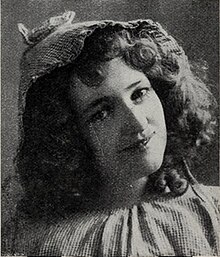Mamie Gilroy (c. 1871 – August 8, 1904) was an American actress and singer in musical theatre.
Mamie Gilroy | |
|---|---|
 Mamie Gilroy, from a 1901 publication. | |
| Born | c. 1871 (some sources give 1878) New York |
| Died | August 8, 1904 New York |
| Nationality | American |
| Occupation(s) | actress and singer |
Early life
editGilroy was born in New York, the niece of Thomas F. Gilroy,[1] who was mayor of New York in 1893 and 1894. In some sources she is confused with her cousin, the mayor's daughter Mary Agnes Gilroy Mulqueen (1865–1938).[2]
Career
editGilroy began her career as a small child in stock companies, including those associated with Charles H. Hoyt and Charles Frohman.[3] She had roles in Only a Farmer's Daughter (1885), The Fakir (1890),[4] Romany Rye (1891),[5] Tuxedo (1891–1892),[6] Babes in the Woods (1893),[7] A Milk White Flag (1894),[8] Davy Jones (1894),[1] The China Dog (1895),[9] Little Miss Busybody (1895),[10] The Strange Adventures of Miss Brown (1896),[11] The Merry-Go-Round (1896),[12] Miss Manhattan (1897), Trilby (1898),[13] Mam'selle 'Awkins (1900), Star and Garter (1900),[14] El Capitan (1901), The Giddy Throng (1901),[15] The Girl from Paris (1898, 1902),[16] Lady Bountiful (1902),[17] and George W. Lederer's Mid-Summer Night Fancies (1903). She sang "Everybody Wants to Kiss the Baby" in the musical farce After Office Hours (1901).[18][19]
The Boston Globe called Gilroy "one of the brightest, most vivacious, and altogether most charming soubrettes on the American stage."[2] Gilroy proposed founding a church especially for theatre professionals in 1898.[20] In 1901, her face, name, and words were used in print advertisements for Dr. Greene's Nervura, a "blood and nerve remedy" marketed to women.[21] In 1902 Gilroy became an honorary member of the Theatrical Mechanics' Association.[16]
Personal life
editIn 1888 Gilroy was hit by a horse-drawn ambulance on the street in New York; she was described as being 17 years old at the time.[22] In 1894, she was "thrown from an electric" trolley in Boston.[23] In 1898, she announced her engagement to Francis W. McNamara, a public health doctor in Chicago.[24] McNamara, who was already married, said the announcement was a joke.[25] Gilroy died from heart disease in 1904, aged about 33 years (though obituaries gave her age as 26 years), at her home at 130 East 115th Street in New York City.[2][26]
The "Mamie Gilroy" cocktail
editThe "Mamie Gilroy" cocktail was named for the actress; it consists of whiskey, ginger ale and lime.[27][28]
References
edit- ^ a b "Vivacious Mamie Gilroy". The Boston Globe. July 1, 1894. p. 18. Retrieved May 14, 2019 – via Newspapers.com.
- ^ a b c "Mamie Gilroy dead". The Boston Globe. August 9, 1904. p. 2. Retrieved May 13, 2019 – via Newspapers.com.
- ^ "Mamie Gilroy". Boston Post. June 14, 1896. p. 11. Retrieved May 14, 2019 – via Newspapers.com.
- ^ "The Fakir". Wisconsin State Journal. October 10, 1890. p. 4. Retrieved May 14, 2019 – via Newspapers.com.
- ^ "'Romany Rye' at Cordray's". The Seattle Post-Intelligencer. Jun 14, 1891. p. 13. Retrieved May 14, 2019 – via Newspapers.com.
- ^ "Tuxedo's Soubrette". Boston Post. September 7, 1892. p. 5. Retrieved May 14, 2019 – via Newspapers.com.
- ^ "The Theatres". The Philadelphia Inquirer. February 19, 1893. p. 11. Retrieved May 14, 2019 – via Newspapers.com.
- ^ "Among the Players". Boston Post. November 9, 1894. p. 4. Retrieved May 14, 2019 – via Newspapers.com.
- ^ "Footlight Flashes". The Philadelphia Inquirer. September 8, 1895. p. 4. Retrieved May 14, 2019 – via Newspapers.com.
- ^ "Girard Avenue: Little Miss Busybody". The Philadelphia Inquirer. December 22, 1895. p. 18. Retrieved May 14, 2019 – via Newspapers.com.
- ^ "How Mamie Gilroy Was Taken In". Boston Post. October 18, 1896. p. 11. Retrieved May 14, 2019 – via Newspapers.com.
- ^ "The Merry-Go-Round". The Boston Globe. May 31, 1896. p. 18. Retrieved May 14, 2019 – via Newspapers.com.
- ^ "Trilby at the Bowdoin". Boston Daily Globe. November 15, 1898. p. 2. Retrieved May 14, 2019 – via Newspapers.com.
- ^ "Star and garter". Library of Congress. Retrieved May 14, 2019.
- ^ "The New York". The Cast. 3: 294. February 11, 1901.
- ^ a b "Stage Matters". Boston Post. April 17, 1902. p. 7. Retrieved May 14, 2019 – via Newspapers.com.
- ^ ""Lady Bountiful" Sheet Music". National Museum of American History. Retrieved May 14, 2019.
- ^ "The New York". The Cast. 3: 514. March 18, 1901.
- ^ "New York Theatre". The Cast. 3: 360. February 25, 1901.
- ^ "Mamie Gilroy's Novel Plans for a Church for Actors". The San Francisco Examiner. February 6, 1898. p. 6. Retrieved May 14, 2019 – via Newspapers.com.
- ^ "Miss Mamie Gilroy's Narrow Escape (advertisement)". The Philadelphia Inquirer. May 12, 1901. p. 30. Retrieved May 14, 2019 – via Newspapers.com.
- ^ "Run Over by an Ambulance". The New York Times. February 16, 1888. p. 2 – via ProQuest.
- ^ "Mamie Gilroy Thrown from an Electric". Boston Post. August 23, 1894. p. 6. Retrieved May 14, 2019 – via Newspapers.com.
- ^ "Mamie Gilroy's Next Role". The San Francisco Examiner. February 2, 1898. p. 4. Retrieved May 14, 2019 – via Newspapers.com.
- ^ "Dr. M'Namara Calls it a Joke". Chicago Tribune. February 3, 1898. p. 2. Retrieved May 14, 2019 – via Newspapers.com.
- ^ "Mamie Gilroy Dead". The New York Times. August 9, 1904. p. 7 – via ProQuest.
- ^ "Mamie Gilroy | Broadway Photographs". www.broadway.cas.sc.edu. Retrieved May 14, 2019.
- ^ Mixologist, Chief. "Mamie Gilroy". Epicurus.com Beverages. Retrieved May 14, 2019.